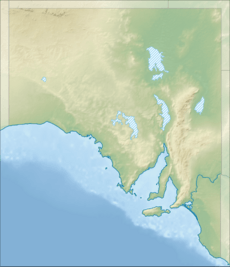Parndana Conservation Park facts for kids
Quick facts for kids Parndana Conservation ParkSouth Australia |
|
|---|---|
|
IUCN Category III (Natural Monument)
|
|
| Nearest town or city | Parndana, |
| Established | 26 September 1968 |
| Area | 625 hectares (1,540 acres) |
| Managing authorities | Department of Environment, Water and Natural Resources |
| See also | Protected areas of South Australia |
Parndana Conservation Park is a special protected area in South Australia. It is located on Kangaroo Island, a beautiful island known for its unique wildlife. This park was officially created in 1968. Its main purpose is to protect the native plants and animals that live there. It helps keep a part of the island's natural environment safe.
What is Parndana Conservation Park?
The conservation park covers about 580 hectares. That's a huge area, like 580 football fields! It is located in a place called Cassini. This is about 7 kilometers northeast of the town of Parndana. The park is in the central part of Kangaroo Island. It's also about 30 kilometers west of Kingscote, which is a larger town on the island.
This park is recognized internationally as an IUCN Category III protected area. This means it is important for protecting specific natural features. It's like a natural monument, keeping a special part of the island's environment safe for the future.
Plants and Animals of Parndana Park
Most of Parndana Conservation Park is covered by low open forest and shrubland. You can find trees like Eucalyptus baxteri and Eucalyptus cosmophylla here. Below these trees, there are shrubs such as Allocasuarina muelleriana, Banksia marginata, and Banksia ornata. Other plants include Xanthorrhoea tateana, Leptospermum myrsinoides, and different types of Hakea.
Some areas along the park's drainage lines have an open forest or woodland. Here, you might see Eucalyptus cladocalyx trees. Underneath them, you'll find plants like Acacia paradoxa.
The park is a very important home for Glossy Black Cockatoos. These special birds use the park for finding food and building their nests. Protecting this park helps these beautiful cockatoos survive and thrive.
 | William L. Dawson |
 | W. E. B. Du Bois |
 | Harry Belafonte |


